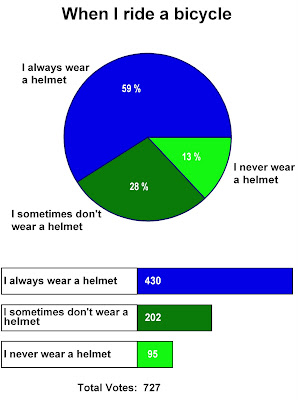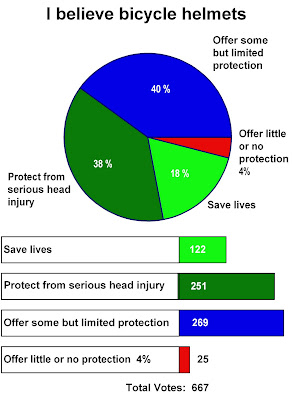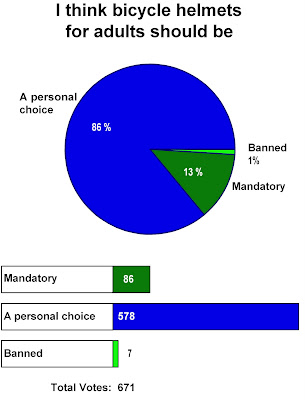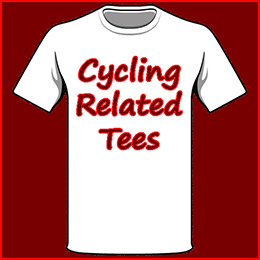I can’t think of a more controversial subject to write about than bike helmets and the wearing thereof. Nothing will get a cyclist’s anti-bacterial padded shorts in a knot more than saying they should or should not wear a helmet.
To borrow a line from my own novel, “It’s like trying to peek at a snake in a pool cue case.” Let’s see if the bastard will turn around and bite me.
I believe the subject is like religion or politics; an individual should do what they believe is right, but should not necessarily try to force their beliefs on others. I wear a helmet when I ride, but it is not my place to tell others to do the same, anymore than it is my place to say others should wear a seat belt when they drive.
People get extremely passionate on both sides of the fence, and get very upset when others oppose their view. I wouldn’t say I am passionate about the issue even after my accident last December when an SUV made a left turn in front of me. I slammed head first into the side of the vehicle.
I was wearing a helmet, but still came away with a hairline skull fracture; I also damaged a nerve in my right eye. This has left me with double vision that persists even after almost a year has elapsed.
The helmet broke, and it is my view that it did absorb some of the impact. Without it, my injuries might have been worse, even fatal. On the other hand, I could argue that I hit the vehicle at 20 mph and the helmet failed to protect me.
I continue to wear a helmet when I ride, but because they don’t offer total protection, I wear it only as a last line of defense when all else fails. Far more important in my opinion is avoiding the accident in the first place.
A recent report on child related bicycle accidents stated that there are 10,700 children hospitalized each year in the US because of bicycle accidents. The report goes on to say a third of this number had traumatic head injuries, and wearing helmets would reduce these head injuries by 85%. I guess I was one of the unlucky 15%; that is if you consider a skull fracture a traumatic injury.
The report states 30% of the accidents involved automobiles. However, there is not a single mention of safety training for children, or drivers of automobiles. So in other words, buy a kid a bike, put a helmet on their head, send them out on the streets, and they’ll be fine. I don’t think so.
Try to get children and teens to wear helmets by all means, but proper road safety education, I believe, would cut these numbers far more than helmet use, even mandatory use. Of course, this is the parent’s responsibility, but it is the parents who need educating first. Most of them don’t ride a bike themselves, so they don’t have a clue.
Don’t get me wrong, I am not anti-helmet use; I just think some of the pro-helmet advocates would be doing more to help the cause of cycling, if they put their energy into pushing for road safety education, with helmet wearing as part of that.
Bicycle helmet use is still very much an American thing. It began in the US in the 1970s and is slowly spreading to the rest of the world. However, it is not practiced, preached, or accepted in other countries at the level it is in the United States. Certain countries have more of a cycling culture where almost every car driver is also a cyclist; I would feel perfectly comfortable riding there without a helmet.
Many people will not ride a bike if they are forced to wear a helmet, or even if they are made to feel like some social misfit if they ride a bike without one. Helmets have been accepted by roadies because they have been accepted by the pro racers. If you wear the Lycra jersey, shorts and shoes, then the helmet goes with the whole ensemble.
But, put a road helmet, with its bright colors and duck’s arse styling on a guy in a business suit commuting to work, and he looks a total dork. Some will say putting appearance over wearing something to protect your head is stupid, and it may be.
However, try telling that to the teenage kid who is wears a helmet as he cycles to school, and has to run a gauntlet of abuse from other kids. He will quit wearing the helmet, and if forced to wear it, will quit riding his bike. And that is a damn shame.
Some kids are wearing the round skateboard style helmets while riding their bikes, because they “look cool.” This should be encouraged and helmet manufacturers should take note. Produce some plain oval shaped black helmets.
Forget for a moment the safety issue of bright colors and being seen. Get people to ride a bike and feel comfortable about wearing a helmet first; they will come around to wearing bright colors later. Look how many motorcyclists when legislation forces them to wear a helmet, they will opt for a small, plain black one.
I hope I never see the day when there is widespread mandatory wearing of bicycle helmets, for the simple reason they do not offer total protection; manufacturers need to keep working on that one. I realize it is difficult to make a bicycle helmet light enough to be practical and offer full protection.
However, bring in mandatory helmet wearing, and before long governments will push for full protection standards. Then we will all be wearing motorcycle style helmets and dying of heat exhaustion.
Okay, just my point of view and it is not my place to force it on others. Feel free to disagree and even put forward an opposing viewpoint; all I ask is, please be civil about it. But just in case, I’m going to get my snake bite kit ready.
 Wed, July 2, 2008
Wed, July 2, 2008  Those who read this blog at least, wear a helmet all or most of the time; 13% don't
Those who read this blog at least, wear a helmet all or most of the time; 13% don't In retrospect, I probably should have left the “saves lives” option out, because it split the vote. If you add the top two together, most feel that a helmet gives considerable protection.
In retrospect, I probably should have left the “saves lives” option out, because it split the vote. If you add the top two together, most feel that a helmet gives considerable protection. Clearly, although many get passionate over the helmet issue, only a relative few want to make them mandatory. The majority feel it should be a personal choice.
Clearly, although many get passionate over the helmet issue, only a relative few want to make them mandatory. The majority feel it should be a personal choice. Dave Moulton | Comments Off |
Dave Moulton | Comments Off | 


















Mandatory Helmets: The Deeper Issue
Dr. Ian Gillespie (Right.) President, British Columbia Medical Association is making such a call as reported in the Vancouver Sun.
A man like Dr. Gillespie, because of his position, carries a lot of weight and before you know it, politicians are passing legislation to bring in mandatory helmet laws.
Don’t get me wrong, I wear a helmet and I think they are a good idea. However, my helmet is my last line of defense and my best chance of survival is to avoid an accident in the first place.
I do this by following the rules of the road. I stay alert at all times to potential hazards, and try to avoid mishaps before they occur.
Helmets should be encouraged, but not made mandatory. The moment you force people to wear a helmet, you stop a great many people from riding a bike.
At this time, in this economy, oil dependency, and with rampant obesity, we need more people riding bikes.
Mandatory helmet laws, give the impression that cycling is dangerous. There are far more pedestrians killed than cyclists, and moreover, most pedestrian deaths are from head injury.
The pedestrian is hit below the waist, his head either hits the windshield or some other part of the car; or he is flipped upside-down, thrown high in the air, and lands on the hard pavement, on his head.
There is no push from the medical profession to make helmets mandatory for pedestrians.
Would you want to be forced to wear a helmet while walking around town? Many people feel exactly the same way when forced to do so while riding a bike.
If a cyclist is involved in a serious accident, a head injury is only one of the ways he might be killed or seriously injured. For example, in Jarvis, Ontario, Canada, a 21 year old man was riding home from work on the sidewalk.
An SUV made a left turn into a parking lot and the cyclist ran head first into the passenger side window. The glass shattered, and the unfortunate young man cut a main artery in his neck, and bled to death within minutes.
The fact that he was not wearing a helmet was neither here nor there in this case; it was not a head injury that killed him.
None-the-less, this accident should not have happened. It was daylight; had the cyclist been on the road instead of the sidewalk, the driver of the SUV would have had a better chance of seeing him before turning.
The cyclist, lulled into a false sense of security that riding on the sidewalk gives, was probably oblivious to his surroundings and failed to notice the vehicle turning across his path.
Over the last hundred years or more, safety legislation has been all about protecting the person in the automobile, giving the occupant such a sense of security that he/she drive their cars as if they are sitting on their living room sofa.
There needs to be a sense of responsibility brought back to driving a car, a looking out for your fellow man and woman; especially those more vulnerable, namely pedestrians and cyclists.
This is what Dr. Ian Gillespie should be pressing for, not mandatory helmets for cyclists.
Because when all is said and done, a little piece of foam polystyrene on a cyclists head will never solve the real issue of cycling death and injury. The one of auto drivers being allowed to drive as they please.
It’s a little bit like allowing everyone to go around firing guns, and then making bulit-proof vests mandatory